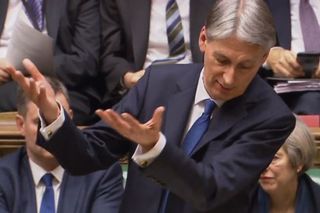
First and foremost was floundering into a trap of the Tory Party's own making. You may recall the weird campaign they ran in the run up to the general election: a promise to spray paint public services with money, while emphasising prudence and responsible spending that channnelled circa 1996 Gordon Brown. At the time, Dave and Osborne made a big show of accusing Labour of wanting to quietly raise National Insurance (or the jobs tax as they opportunistically dubbed it), and this forced the sainted Ed to publicly forswear any such thing. Meanwhile, they ensured it appeared no less than four times in their manifesto. And now, the Tories have gone and broken it. Hammond has tried saying that the pledge only meant a certain kind of NI contribution. More fool the Tory electorate for missing the caveat at the time, eh? And so it presents as a straight pledge break, which is something no politician should be seen to do.
And then it's who is affected. It's a smash and grab on the petit bourgeoisie, of the army of small business people and self-employed whose ranks swelled after the crash hit, redundancies were handed out and secure job opportunities shrivelled up. Traditionally the backbone of centre right parties everywhere, it's as if Hammond failed to make the political calculations as he was adding up the sums. Or perhaps he did, thinking it unlikely they'd pass over to Labour amidst its current travails. Which might be true, but there are other options for narked off Tory voters. From a press reception point of view, it was never going to go down well with the perennially terrified readers of The Daily Mail anyway. But neither did he latch on to the position of freelance hacks and those associated with right wing titles in a self-employed capacity: many a columnist would have to cough up. Bearing in mind Osborne delivered budgets much worse then Hammond, and much more damaging too, it's amusing to see the Tories hit with a wall of negative coverage.
Then why do it? The Conservatives are galloping ahead in the polls, May is retaining a favourable approval rating, and for the most part the media remain entirely fixated on Jeremy Corbyn and how many times he blew his nose today. An unnecessary own goal? Perhaps. From a technical-fiddly point of view of raising extra monies, it does have the virtue of bring National Insurance in line with PAYE and making the system fairer, as Hammond puts it. And, while it would be news to most wage and salary earners that self-employed people have enjoyed reduced contributions rates, now they do know about it the Tories are going to have to bank on them thinking it's fair too. A bit of a gamble to be sure, but if this is "necessary" then now is the time to do it.
This morning, Nick Robinson referred to Hammond as "Spreadshit Phil". Perhaps it wasn't entirely a slip.
3 comments:
Another alternative is that it is a trap for Labour (some of our back-benchers have already supported it), which Mcdonnell has not fallen for. Instead he has trod a very careful line of opposing it, but not ruling out an equalisation between employed & self-employed NI contributions.
Hammond may have expected the row it would cause with his back-benchers, but calculated that by the time he was seen to give in (accept their advice) Labour would be in the position of supporting a tax rise, which the Tories were voting against.
Mcdonnell by some clever footwork is now in the position whereby if Hammond backs down Labour can take credit and if Hammond doesn't Labour is in the happy position of voting against a tax rise whilst the Tories are in all sorts of disarray.
Good piece here from the excellent Torsten Bell
http://www.resolutionfoundation.org/media/blog/reforming-tax-for-the-self-employed-should-be-welcomed-by-progressives-and-fiscal-hawks-alike/
So this is broadly a good thing, genuinely progressive and sensible.
Labour should say so. It should also say that they first suggested doing something similar under Ed M. Raising some taxes in difficult times is the right thing to do, if it safeguards our public services and protects the vulnerable.
They should also point out that the Tories emphatically said they they wouldn't raise any taxes and put it in their last manifesto. They have now reneged on a clear commitment. Thats something our front bench should be able to hammer them on I'd have thought.
Steve
Setting aside the rights and wrongs of breaking an election promise for the moment I guess the question that should be asked is, was he right to raise NIC Class 4 payments?
If we need more revenue to pay for essential services in an economy that is not growing sufficiently strongly to increase tax receipts "naturally" then raising it through progressive taxation is surely the fairest way to do it. Should SE people be targeted as opposed to, say corporations or higher earners is worth asking but generally I don't see much that is wrong with this move, and I speak as a member of a family where Self Employment has been a way of life for over 30 years.
The problem for Hammond is three fold, he broke a pretty clear election pledge, he is targeting what is traditionally a Tory demographic and, probably worst of all for him, within the ranks of the Self Employed are a plethora of freelance media hacks and pundits who will no doubt begrudge paying a little extra to fractionally bolster the social case system.
I fully expect some sort of about face in the coming days.
Post a Comment